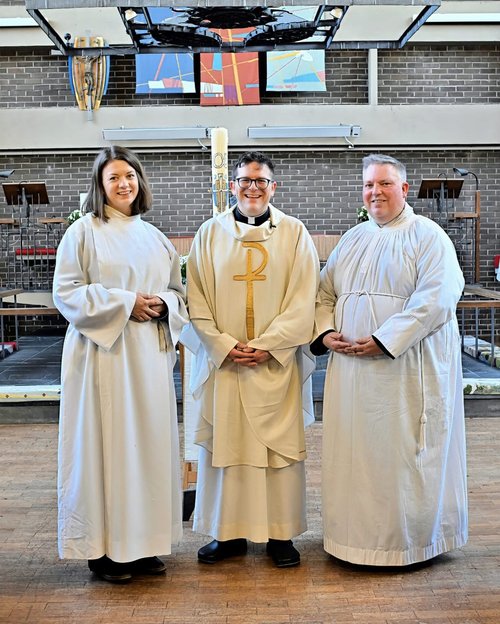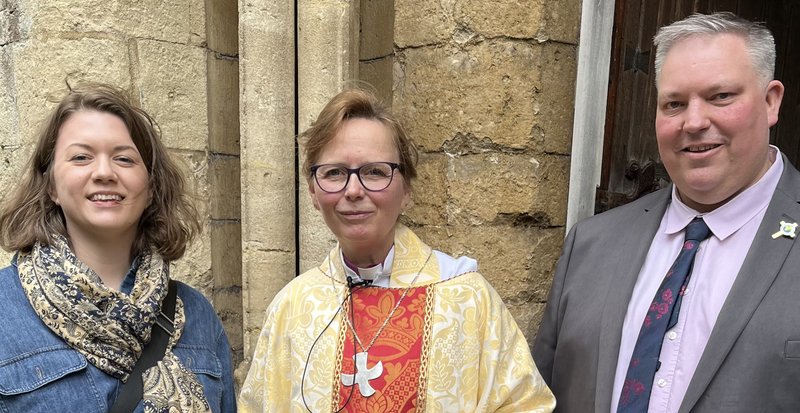With God and His Mercy- Reflections of a Swedish Ordinand
Dear friends in the Diocese of Llandaff,
It has been a joy and a blessing to spend Holy Week with you at Christ Church, Roath Park in Cardiff, as part of my priestly formation in the Church of Sweden. This opportunity was made possible through the companion link between Uppsala Diocese and your diocese – a link I am deeply grateful for.

My fellow seminarian Valter visited you last autumn, and what he shared inspired me to experience the life of your church community firsthand – especially how you live out your faith in a bilingual setting. In Sweden, we are also engaging in conversations around language and identity, particularly through the Church of Sweden’s ongoing process of reconciliation with the Sámi people, Sweden’s Indigenous population.
Since the Church of Sweden’s formal apology to the Sámi in 2021 in Uppsala Cathedral (and again in Sápmi in 2022), we have committed to a range of actions to build genuine reconciliation. These include support for Sámi language revitalization and the incorporation of Sámi languages into church life and worship – a process that is still unfolding and requires sustained commitment and learning.
One of the most striking experiences for me during my visit was encountering the bilingual ethos at Christ Church. In conversation with Father Orion, he described the use of Welsh in services as limited. Yet from my perspective, Christ Church can already be seen as a hopeful example of integrating a minority language into worship. This encounter encouraged me to reflect on how the Church of Sweden might continue deepening its own commitment to linguistic inclusion, ensuring our reconciliation work moves from intention to visible practice.
I was particularly inspired by Bishop Mary’s vision for ordinands to learn Welsh. This aspiration came to life in worship through my new friend Richard, who will be ordained as a deacon next year and who contributed elements of Welsh to the liturgy. It is uplifting to see theological education in Wales include language learning in such an intentional way. I hope we in the Church of Sweden may one day be equally bold in supporting similar efforts with the Sámi languages. For this to happen, I believe our theological education would benefit from actively including Sámi language and culture as a natural and valued part of priestly formation.
As someone of Sámi heritage who has lost the language, this visit has also made me more mindful of my own responsibility to embody bilingual worship. I have been reminded that full fluency is not a prerequisite for inclusion; even small steps – a greeting, a prayer, a blessing – can begin to open up sacred space for a language to live and breathe in worship. From there, deeper understanding can grow.

The title of this reflection, With God and His Mercy, comes from a beloved Swedish hymn (Med Gud och hans vänskap, which literally translates as With God and His Friendship) often sung in the Swedish Evangelical Mission, a movement within the Church of Sweden, and more broadly across the church. For me, it expresses both a personal sense of spiritual companionship and a wider vision for shared ministry.
That vision includes a calling to proclaim the gospel in a way that resonates with people’s hearts – including through the languages that shape their identities. Whether spoken by many or few, every language has a rightful place at the altar and in our worship. I believe this is part of our calling as ministers of the Church: to make room for the Word in every tongue.
Thank you, Diocese of Llandaff and Christ Church, for your generous welcome and open hearts. I leave with treasured memories, new friendships, and a renewed sense of purpose and hope. I pray our paths will cross again.
Please remember me in your prayers on June 15, as I take my priestly vows in Uppsala Cathedral and begin my service in the parish of Dannemorabygden.
Best wishes and God bless,
Jennifer Ögren